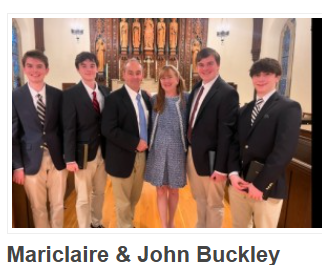St John’s Goings-On
Chloe Manning will be joining St. John’s on November 12 as our new Parish Administrator. Chloe grew up in West Hartford, Conn., and has a B.A. in Biology from the University of …
Please join us for our annual fall outdoor cleanup, organized by St. John’s Creation Care Ministry. We will prepare our gardens for the fall and work on a few small projects around the Church …
The St. John’s Holiday Boutique brings a curated selection of amazing vendors offering everything from homemade jam to exquisite hand-crafted jewelry to outdoor apparel! This year, we …
In response to the government shutdown, federal workers not getting paid and SNAP benefits not being funded, St. John's is supporting a "Neighbors Helping Neighbors" initiative in …
St. John’s welcomed 50 kids to the Not-So-Spooky Haunted House from St. Stephen’s BeLearn after-school program Friday night. The 1st- through 4th-graders and …
Are you looking to connect with other parishioners who are new to St. John the Evangelist? Join us for a festive hike at World’s End on Saturday, November 1! This is a wonderful opportunity to …
Throughout generations, women gathering at a well was significant as a social center for community and a symbolic location for encountering spiritual truth and receiving living water. This is …
We are only weeks away from the 25th Anniversary of the Holiday Boutique! As always, there is still a lot to do and we can use your …
Choral Evensong at The Parish of St. John the Evangelist is a small part of a whole: it is part of the worship which is offered to God by Christian people every hour of …
St. John’s annual stewardship campaign is underway! Thank you to those who have already pledged. Your pledges determine how we …
B-SAFE is usually associated with summer. After all, “summer” is in the name: Boston’s Summer Academic & Fun Enrichment program. But on Oct. 24 St. John’s will bus about 50 kids to …
As we move into October, life at St. John’s certainly begins to become more … lively … And so, I want to start this week by offering several thanksgivings and also a few reminders about …
Save the date for our Confirmation Info Session on Sunday, December 7 at 4 p.m. This year’s confirmands will explore the beliefs and practices of the Episcopal Church and the …
Our next youth group meeting is Saturday Oct. 18th when we’ll be watching a movie in the Haunted House! We’ll get started after the Haunted House closes at approximately 7 p.m. This event is …
Exciting news! We are implementing a job matching tool whereby youth can sign up to be matched up with paid jobs for parishioners. Read more …
The Vestry is pleased to share approved Vestry Minutes and Treasurer’s Reports of Vestry meetings through June 2025. The Vestry hosts regular “Office Hours” an opportunity to meet …
Welcome back! It was wonderful to see so many familiar faces, and welcome new ones on Homecoming Sunday. In an effort to …
There’s so much going on at St. John’s this week, and I want to tell you about all of it, but everyone’s already written such great blurbs about their own ministries, so if you want to hear about …
The Outreach Committee is pleased to announce that the Hingham Food Pantry will once again be the beneficiary of St. John’s Octoberfood drive. The mission of the Hingham Food Pantry is to …
Hingham’s Not-So-Spooky Haunted House is back for its 8th year. Our 2025 dates are October 17, 18, 24 & 25, Friday nights 5 to 7 and Saturday nights 4:30 to 7.
St. John’s Chorister is welcoming new singers in grades 3–8. Rehearsals are every Tuesday at 4 p.m. beginning Sept. 9. Choristers sing once a month for worship, and …
Join us on Sunday, Sept. 21 for the return of evening worship. The weekly 5 p.m. service, held in the sanctuary, will alternate between a shorter Rite II (contemporary language) evening prayer led by …
The 2025-2026 Program Year calendar is now available! The above weekly schedule outlines the regular worship opportunities at St. John’s in the fall, and the program year calendar …
This Sunday, September 7, is Homecoming Sunday! Join us after the service for a potluck lunch, play some games, catch up with old friends and meet some new ones. It will also be a great …
Welcome back to The Episcopal Parish of St. John the Evangelist in Hingham! Whether you have been away for the summer, at home all season, or have drifted in and out in recent months, …
After an eventful week in Cape Town, the group of now nineteen arrived in Johannesburg for the second half of our travels. On our first day, we met our second wonderful …
Please save the date of Sept. 14 from 6–7:30 p.m. for our annual Youth Kickoff Event! There will be music, games, and pizza for the Youth in Lower Weld. In Upper Weld, there will be …
When I started at St. John’s on July 1, I was told that my timing was perfect, because I would have a slow—maybe even boring—couple of months to get settled in, before …
The South Africa trip was a huge success! A special thanks to Holly and Bill Carter for organizing this amazing experience for us. We are all …
Thanks to your support, we have made our delivery of 125 backpacks to the Quincy Family Resource Center. Now, we just need 20 backpacks to deliver to …




























